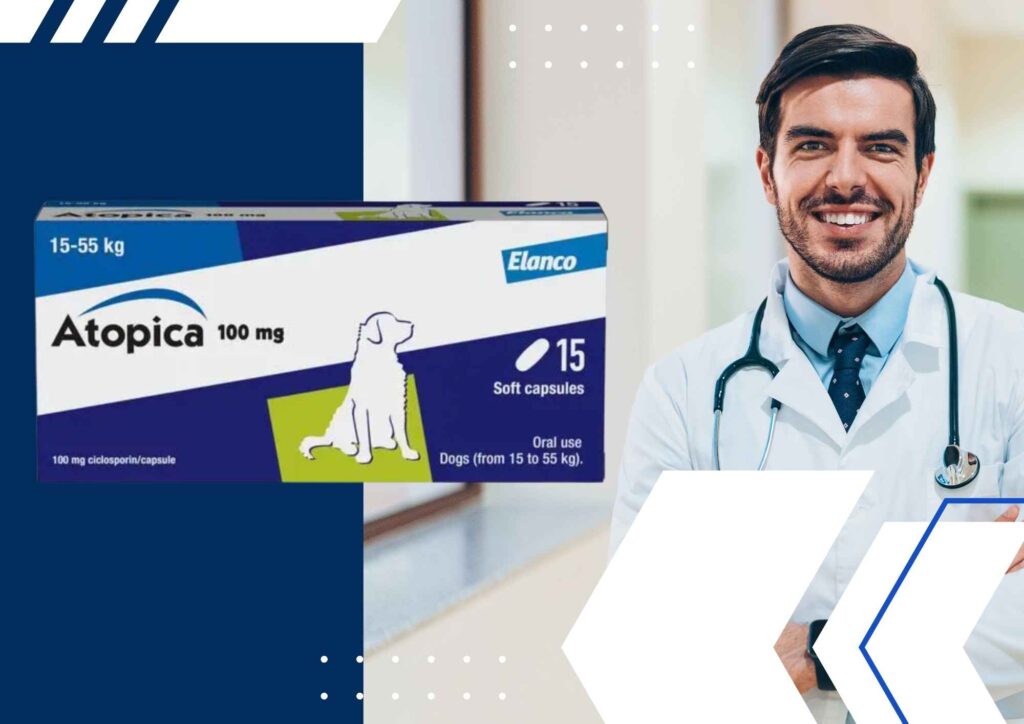Introduction
Your vet can prescribe Atopica for Dogs 100mg if your canine is suffering from chronic allergies in the skin. It is a medication widely prescribed for treating atopic dermatitis, a widespread canine skin disease caused by allergies. But just exactly is Atopica, and how does it work? In this article, we’re going to go in detail about everything there is to know about this medication.
What is Atopica for Dogs 100mg?
It is an oral medication for use in canines affected by atopic dermatitis, and it relieves itching and swelling produced as a reaction to allergies. What is Atopica for Dogs 100mg? It is cyclosporine, an immunosuppressant medication for managing excessive functioning of the immune system in response to allergens.
What is Atopica for Dogs 100mg? It is a medication without steroids providing prolonged relief for allergies in the skin. What is Atopica for Dogs 100mg? It is orally taken once daily, depending on weight and veterinary recommendation.
What is Atopica for Dogs 100mg? It is prescribed to improve canines’ quality of life in cases involving chronic conditions in the skin. What is Atopica for Dogs 100mg? It is known as a good substitute for steroids and is associated with fewer side effects. What is Atopica for Dogs 100mg? Some canines experience mild side effects in the form of diarrhea or vomiting but resolve quickly.
What is Atopica for Dogs 100mg? It should be taken on an empty stomach for best efficacy. What is Atopica for Dogs 100mg? Report to your veterinarian at once if your canine experiences extreme reaction. What is Atopica for Dogs 100mg? It is a trusted remedy for managing canine atopic dermatitis and general improvement in skin conditions.
Common name:
The generic name for Atopica is Cyclosporine. It is classified as an immunosuppressant, and immunosuppressants are medicines that calm down an out-of-control immune system.
Drug Classification:
Atopica is immunomodulatory in nature. It is utilized for reducing excessive immune responses resulting in pruritus and irritation in the skin.
Mechanism of Action:
Atopica works to block T-lymphocytes, a type of immune cell that is involved in creating allergic responses. By blocking them, the medication reduces itching, redness, and lesions in the skin.
How Does Atopica Work in Dogs?
How It Oppresses The Immune System:
Cyclosporine specifically suppresses immune system responses resulting in inflammation. It does this to prevent excessive itching and skin injury in hypersensitivity cases in dogs.
Role of Cyclosporine in Treatment of Allergy:
Whereas steroids have serious side effects, cyclosporine is known to provide extended relief without the risks associated with using steroids.
Route of Administration of Atopica
Oral Administration:
Atopica is in capsules and is orally taken. It should be taken on an empty stomach for better absorption.
Dosage Forms Available:
Atopica is available in different strengths, including 10mg, 25mg, 50mg, and 100mg capsules.
Recommended Dosage for Atopica 100mg
Standard Dosage By Dog Weight:
- Weight 15-29 lbs: once at 25mg
- Dog weight between 30-59 lbs: 50
- Dog sizes between 60-89 lbs: 100mg
- Dogs weighing 90-130 lbs: 150mg daily
Adjustment and Dosage Consideration:
- Once there is improvement, doses can be reduced.
- Always use as instructed by your veterinarian.
How quickly does it start to be effective?
Most improve in 4–6 weeks. A few can be improved in as little as two weeks.
Indications – When should Atopica be used?
TREATMENT OF CANINE ATOP
Atopica is typically prescribed for atopic dermatitis, a form caused by allergens in the environment.
Other Uses of Atopica in Veterinary Medicine:
- Autoimmune disorders
- Inflammatory Bowel Disease (IBD)
- Perianal Fist
Contraindications – When NOT to use Atopica
Dogs That Should Avoid Atopica:
- Six month old puppies
- Dogs who have or have had tumors or cancer
- Dogs affected with liver or kidney disease
Special Precautions for Pregnant and Lactating Bitches:
Use in pregnancy and in lactation is not recommended in dogs.
Possible Side Effects of Atopica
Common Side Effects:
- Von
- Diarr
- Loss of appetite
Serious Adverse Reactions
- Increased susceptibility to infections
- Gum overgrowth (gingival hyperplasia)
- Liver or kidney disorders (rare)
Handling Side Effects:
- Handling side effects is Most mild side effects resolve after some time.
- If serious reactions occur, contact your vet immediately.
Drug Interactions – How Does Atopica Interact with Other Drugs
Common Drug Interactions:
- Ketoconazole (raises levels of
- NSAIDs (enhanced risk for nephrop
- Particularly, some
Evading Harmful Interactions:
Inform your veterinarian about all medication being taken by your dog in order to avoid potential medication interactions.
How to Give Your Dog Atopica Correctly
Recommended Best Practices for Administering Atopica:
Take Atopica on an empty stomach, if possible one hour before or at least a minimum of two hours after eating, to ensure maximum absorption.
Take at once each day for regularity.
Yes, atopica can be taken with food.
In case vomiting is experienced, attempt to administer the capsule with a little food.
Handling and Storage of Atopica
Proper Storage Requirements:
- Store at room temperature (59°-77° F).
- Store in a dry place and avoid direct sunlight.
Safety precautions for Pets and Kids
- Keep out of reach of children and animals to avoid accidental use.
Alternative Medications and Treatments
Alternative Prescription Drugs for Dog Dermatitis:
- Apoquel (Oclacitinib)
- Cytopoint (Injection)
Home remedies and natural remedies:
- Omega-3 fatty acids
- Hypoallergenic diets
Frequently Asked Questions (FAQs)
Can Atopica be used for other pets?
Atopica is approved for feline and canine use but in varied doses.
How long does my dog need to stay on Atopica?
Most require extended treatment but can taper down doses later.
What happens if I miss a dose?
Give the missed dose as soon as you remember, unless it’s close to the next dose.
Is Atopica a steroid?
No, Atopica is an immunosuppressant, not a steroid.
Are there long-term risks with Atopica?
Long-term use increases infection risk but is preventatively managed. Please don’t forget to review us.



